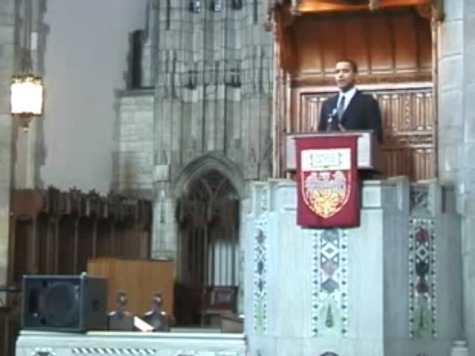
With the release of a 2007 speech in which candidate Obama made some unusually strong statements about race, now is as good a time as any to reveal another long lost Obama video. This clip from a January, 21 2002 speech at the University of Chicago was uncovered by blogger Morgen Richmond last year. It shows State Senator Obama talking about the legacy of Dr. King. In the process, he also reveals some strong political and philosophical opinions which touch on issues of race, crime, education, and wealth in American society.
After introductory remarks, he begins with a discussion of the hidden difficulties and even despair that existed under the shiny surface of the Clinton years. This leads to a suggestion that there is much work yet to be done in America and a comparison between the challenges of the civil rights movement in the ’60s and the challenges of 2002. Obama then transitions to his three main points which are framed as the three principles that kept Dr. King going: empathy, personal and corporate responsibility for our actions, and hope.
The Clinton Years
It was the best of times, it was the worst of times.
Obama sets the stage for his later comments by portraying the Clinton
years as a time of outward prosperity but inward trouble. This is the
kind of analysis Democrats usually reserve for Republicans like Ronald
Reagan. The Reagan years are commonly called the “decade of greed” by
many Democrats. It’s a bit surprising to see Obama giving the Clinton
90s this treatment, especially in light of his recent efforts to connect
his own economic policies with those of Clinton.
An Empathy Deficit More Serious Than the Federal Budget Deficit
Skipping
ahead slightly to the first of Obama’s main points, he explains the
centrality of empathy, “a philosophy that’s grounded in the simple
premise that we share some common ground.” At this point he makes his
most explicitly racial comment of the speech, saying “It’s hard to
imagine that the powerful in our society would tolerate the burgeoning
prison-industrial complex if they’d imagine that the black men and Latino men that are being imprisoned were something like their sons.”
This gets a round of applause. Obama then goes on to make a similar
statement about “the powerful” and their views of education and senior
citizens. Obama caps this section by saying “It seems we have an empathy
shortage, an empathy deficit more serious than the federal budget
deficit.”
Empathy Between Rich and Poor
In this clip, Obama fleshes out his views on empathy, applying it to the divide between rich and poor. This analysis is revealing as Obama suggests that there is a class struggle underlying society in which non-violence is only one option. He doesn’t spell out the alternative but he does suggest that “accountants and
tax loopholes” are used to keep people down in a way that is reminiscent of the way police treated blacks during the civil rights struggle. He
says at one point “I don’t know if you’ve noticed but rich people are
all for nonviolence. Why wouldn’t they be. They’ve got what they want.”
School Funding is “Fundamentally Unjust”
One
of the stronger policy statements in the speech is Obama’s flat statement that
school funding in America is “fundamentally unjust.” If you’re looking
for something that might become a policy issue in an Obama second term,
this is likely it. As Stanley Kurtz describes in his excellent new book Spreading the Wealth: How Obama is Robbing the Suburbs to Pay for the Cities, Obama’s allies have been quietly laying groundwork for a shift in how money is distributed between suburbs and cities. School funding will be at the core of this debate.
Many of the themes of Obama’s speech, which walks a fine line between policy and sermon, will be familiar to those who have watched his career closely. Obama’s view of empathy became a public issue when he appointed his first Supreme Court Justice. His discussion of personal and corporate responsibility touches on some of the same private vs. public themes which got him in trouble earlier this summer when he inartfully suggested said “you didn’t build that.” And, of course, hope was the title of his second memoir and one of the major themes of his 2008 campaign.
Obama is thoughtful and at times memorable. He challenges his audience
at points, as well as challenging “the powerful” (an ironic choice given
that he would become the most powerful man in the world eight years
later). The full speech helps explain the philosophical source of many of Obama’s familiar ideas and may even become a kind of philosophical skeleton key to his beliefs as president.
But mixed in with the philosophy Obama also reveals he had some strong opinions on race, crime, education, and wealth. While these fit naturally in the context of the speech and are likely still things he believes, they are the sorts of opinions he has downplayed since 2004. That was the year in which his speech to the DNC transformed him into a post-partisan who was going to heal the nation’s divides. While there are definite similarities to parts of this 2001 speech, the strong opinions stand out. These are not things post-2004 Obama would say in public.

COMMENTS
Please let us know if you're having issues with commenting.